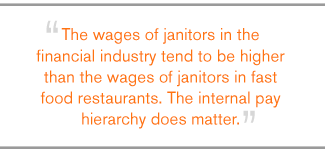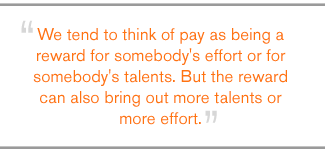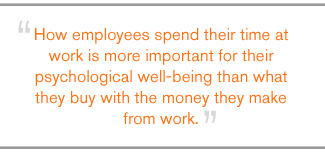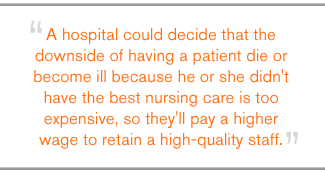Most of us would rather chat about sex and religion than our take-home pay, but it's not the former that makes the world go 'round. Even if your company offers an energizing workplace, cutting-edge benefits, and imaginative perks, your employees will stop coming to work if you stop paying them.
 |
Yet the effect of pay on workers isn't simply transactional, and it's far more emotionally complex than most mainstream economists would admit. Neoclassical economics accepts as a central truth that humans make strict value assessments about what they'll do and how much they'll pay. But when you take the tenets of neoclassical economics to their logical conclusions, you'll sometimes end at conclusions that just don't fit reality.
This is where behavioral economics comes in. A synthesis of neoclassical economics and psychology, behavioral economics doesn't assume that people are entirely rational -- or faultlessly logical -- when making decisions. The role of emotion in decision making is central to the field, which is one reason why behavioral economics offers many insights into work issues -- including pay.
What behavioral economics has discovered about pay challenges what many economists thought to be gospel truth -- and what many managers would find irrational. Organizations that work from a traditional neoclassical economics template may fail to understand what people will and won't do for money -- and the business applications of that can be costly, so to speak.
One of the leading lights of behavioral economic research is Alan B. Krueger, Ph.D., Bendheim Professor of Economics and Public Affairs at Princeton University and the founding director of Princeton's Survey Research Center. Dr. Krueger is the chief economist of the National Council on Economic Education; the recipient with David Card, Ph.D., of the prestigious IZA Prize in Labor Economics; and a contributor to The New York Times' "The Economic Scene" column from 2000 to 2006.
In this interview, Dr. Krueger applies behavioral economics to argue that companies can get away with paying lower wages than competitors without losing many employees, though there are hidden costs. And though unions are designed to do what neoclassical economics supposes all jobs do, they can also undermine the very reason for pay itself. Dr. Krueger also says that companies are right to keep pay a secret. In fact, he talks quite shamelessly about what, for many of us, is the last taboo.
GMJ: According to a neoclassical, rationalist economic purview, what's a good job?
Dr. Krueger: Well, all jobs are good jobs. In neoclassical economics, workers are paid according to their contribution to their employer, and in that sense, there is no distinction between a good job and a bad job. There are good workers and bad workers in neoclassical economics, though. A good worker is one who is very productive and is paid highly as a result. A bad worker is one who's not very productive and is paid accordingly.
GMJ: Please forgive me, but that seems unrealistic. There have always been workers who are paid in spite of what they do or don't do -- bad workers who made good money.
Dr. Krueger: Well, in neoclassical economics, that's not the case. What you're saying is that some workers are overpaid and some are underpaid, and I don't think that a firm believer in neoclassical economics would agree with that. It makes a value judgment about what somebody should be paid, and neoclassical economics says that the market independently and correctly determines what people should be paid.
GMJ: Right now, a whole bunch of managers are having a good laugh. Is the view from behavioral economics any different?
Dr. Krueger: In behavioral economics, or I would say in institutional labor economics, there are good jobs and bad jobs. There are some industries in which wages for the same kind of work have always been higher than in other industries, something neoclassical economics wouldn't recognize. For instance, the wages of janitors in the financial industry tend to be higher than the wages of janitors in fast food restaurants. The internal pay hierarchy does matter. It's hard to have the salaries out of whack; it's hard to deny someone a generous raise if the company's doing very well. And, I would argue, it's in the company's interest to be fair about pay -- if you are an employee at a company that has been extremely profitable, and you find you've received a very small pay increase, you might retaliate by not working very hard or taking steps to exact revenge on your employer.
One of the innovations in the labor market is more outsourcing in these kinds of jobs. It's increasingly common to have companies outsource the janitorial work, for instance. When the work is outsourced, employees don't feel as connected with the pay hierarchy in the firm they're cleaning up; the pay hierarchy in the outsource company is what's relevant for them.
 |
But behavioral economics as applied to the labor market is not as well advanced as behavioral economics as applied to the financial markets. The labor market is harder to study. When you're thinking about shares of stock, you can be confident that they're identical products, and they should be trading for the same amount. When you think about workers, though, all workers are different, so the question is: Are those differences relevant? I think it's inherently more difficult to study the labor market because of differences across workers that are hard to observe. At the same time, the labor market is likely to stray from the assumptions of neoclassical economics more than the financial markets because the employment relationship inherently involves psychology, judgment, and emotional behavior.
GMJ: Do you think that behavioral economics will pay more attention to the labor market and find ways to study it that haven't been considered before?
Dr. Krueger: At a certain level, labor economics has always been behavioral, if you go back to the institutional labor economists of Sumner Slichter, John Dunlap, Richard Lester, Lloyd Reynolds, and Clark Kerr. They studied anomalies from the labor market, such as how some managers could get more productivity out of their workers, why workers quit for reasons other than just pay, or how wage structures affected employee motivation.
So at that level, labor economics was behavioral before the rest of economics became interested in behavioral economics. At another level, it wasn't very formal. So labor economics has been influenced by behavioral economics. But I don't know if the whole paradigm will shift within labor economics.
GMJ: Let's get back to the economics of pay. Why would some companies pay more for the same job than others would?
Dr. Krueger: In some sectors, companies realize that worker productivity depends on how well the workers feel that they're treated. An important component of that is how much they're paid. So we tend to think of pay as being a reward for somebody's effort or for somebody's talents. But the reward can also bring out more talents or more effort.
Let me give you an example: Neoclassical economics says that workers shouldn't care about what they're paid in relation to others. They only care about what is in their own self-interest, and that is determined by their own opportunities. It doesn't matter how much your employer pays others as long as you're satisfied with your own pay.
Yet we know that if you take an employee and say, "You're doing okay, but we're going to pay your coworker twice as much for doing the same work," that could create problems for morale and productivity in the workplace. And in neoclassical economics, those morale problems do not make any sense. In neoclassical economics, what I get is what matters, not what my coworker gets, because that doesn't affect me. In this type of a model, knowing how much everyone is paid would help workers to make better decisions about which job they want to aspire to. So in neoclassical economics, we would say that having more information about salaries is good, so companies should make that information available.
GMJ: Why?
Dr. Krueger: Because it will lead to the right matches between workers and jobs. From the workers' standpoint, it's in their interest to know if company A would pay more for the same job than company B -- it's in the workers' interest to know that so they can switch. It's also in company A's interest to attract the best talent.
GMJ: But people care very much about what others are paid -- humans are status oriented.
Dr. Krueger: Right. I think what you're saying, and I agree with you, is that pay does more than clear the market. In neoclassical economics, a worker's salary serves one function, which is to allocate labor. But in point of fact, pay serves many functions, including to motivate or reward workers. And from a worker's perspective, they care about fairness and status. So the pay structure has to be perceived as fair if you want to get maximum performance out of employees.
GMJ: How fair does it have to be if it's secret?
Dr. Krueger: That's a good question, and I've done a little bit of research on how much employees know about what their fellow workers are paid. I once did a survey with employees at a nonunion service company. We asked employees to identify another worker and then tell us how much they thought that other worker was paid. Most of the time, they couldn't or wouldn't guess. It's a taboo subject, and not delving into it may be one way in which employees cope with the sensitivity of the issue. By the way, this was a fairly enlightened, progressive company. I think one way in which workers find it easier to work with each other is not to even speculate on those subjects.
 |
GMJ: So do issues of pay hold the same power in companies where people do know how much everyone else is making, such as union shops?
Dr. Krueger: I suspect that morale suffers. I think there are probably reasons why the social norms developed that discourage employees from discussing pay and employers from bringing it up. But I think employees do want their pay structure to be perceived as fair in case information leaks out. It is also interesting to note that unionized workers report being less satisfied with their jobs despite their higher pay, on average.
GMJ: Can you buy productivity? Can paying people more really create a higher productivity level?
Dr. Krueger: I think it helps. If all else is equal, I think it helps. But you want to do it in a way in which workers perceive it as fair and see a clear link between their performance and pay.
GMJ: How do unions affect this?
Dr. Krueger: Well, it differs. I think in some industries, companies typically become unionized if they were doing a poor job at human resources and employee management. So there are really two driving forces for companies becoming unionized. One is that management has been arbitrary or has in other ways mismanaged the labor force. Another is that there are some -- although it's a declining number -- companies in which employees feel a sense of solidarity, and they want to join an organization like a labor union.
In the first case, the union actually will have a positive effect on productivity because productivity was not as high as it could have been to begin with. In that situation, unions often make human resource management more professional. But in companies where [the] human resources [department] already is professional, there's little to be gained in terms of productivity as a result of labor unions.
So labor unions are a two-edged sword when it comes to productivity. On the one hand, they raise wages, lower turnover, and professionalize labor relations, and that probably has a positive effect. On the other hand, in some sectors, unions have inefficient work rules that probably reduce productivity.
GMJ: People have taken pay cuts just to avoid leaving a job they like, presumably because they're engaged in their job. What's the perspective between the two forms of economics on that?
Dr. Krueger: Neoclassical economics says that people should take well-being into account. When you think about different jobs, you should choose a job that delivers the highest utility, which includes not only pay but also the working conditions -- whether it's a safe job, whether you like the people you work with, or whether you like the hours that you have. Behavioral economics has found that people are willing to take a cut in pay to help the company out if the company is going through a rough time. Neoclassical economics says that shouldn't happen.
So take an individual company that's having a bad year; it's considering trimming its workforce, or it might even close down. In neoclassical economics, the employees can find a job that's just as good somewhere else, but in behavioral economics, employees have some kinship with the company. Behavioral economics also says that employees don't always make decisions rationally about where to work, and they might focus too much on easily measurable aspects of the job like the pay, thinking pay is more important than it actually is. This could lead them to be less focused on the work environment. I would say that how employees spend their time at work -- what their engagement is in their work -- is more important for their psychological well-being than what they buy with the money they make from work.
GMJ: How much can a company afford to compress wages in a tight labor market?
Dr. Krueger: Neoclassical economics says that if you have a competitive labor market, you don't get to set the wage rate; you can only pay what other companies are paying. If you pay a penny less than the going wage for a particular skill group, you'll lose your entire workforce. So the job of a personnel officer is very simple: You just pay what everybody else is paying, and you're done. And you can easily observe if you're paying too little because you won't have any workers. If you're paying too much, then you have a flood of workers.
 |
Researchers on monopsony -- monopsony means "one buyer," like a company town -- say the model I just described is an oversimplification of reality because companies do have some ability to set pay. If they start paying a penny less, they wouldn't lose all their workers. They might lose one or two, but they probably wouldn't lose them all. If they paid 5% less, they might lose more workers, but they still wouldn't lose all of their workers. There's some ability, some maneuvering, in the pay structure that the competitive neoclassical model doesn't recognize.
But in the last twenty years, economists have found that you could get monopsony-like effects even in a tight labor market because of imperfect information. It's costly to search for and change jobs, and employees get attached to their coworkers. So employers actually have some latitude here -- they could pay less than what competitors are paying, or they could pay more. There is some insulation from the pressure to pay exactly what everyone else is paying. This gives companies a reason to think about how much they're paying and to think about how their pay structure might affect their recruitment, how it might affect productivity, and how it could affect worker morale.
GMJ: How should a company think about turnover?
Dr. Krueger: From a neoclassical perspective, a company is just maximizing profit, so that's all it cares about. A company will trade off losing some people because they're paying too little against the fact that they'll be able to retain enough workers to do the job. Take hospitals, for example. They're constantly battling attrition, constantly battling turnover. They could pay the nurses more and have lower turnover, but that's just paying more than they need to some of the nurses. So what many hospitals do is spend a lot of money recruiting, but they keep salaries low. That might not be the best situation for the patient.
GMJ: But there are a lot of hidden costs to turnover, from low productivity to higher recruitment costs. Isn't it just cheaper to engage employees?
Dr. Krueger: Absolutely. That's why there is a tradeoff. What many companies do is try to find the optimal balance. Some companies decide it's too costly to constantly recruit and train new workers or to have vacancies. For example, a hospital could decide that the downside of having a patient die or become ill because he or she didn't have the best nursing care is too expensive, so they'll pay a higher wage to retain a high-quality staff.
You see companies, especially large companies, weighing those considerations: Where do we want to be in the pay structure compared with other companies? Do we want to be at the top or at the middle? Are we willing to put up with the reputation of being a low-wage employer? I think this is one of those situations where a broader view than just the competitive neoclassical model can help to explain what companies are doing and the issues that they face.
-- Interviewed by Jennifer Robison